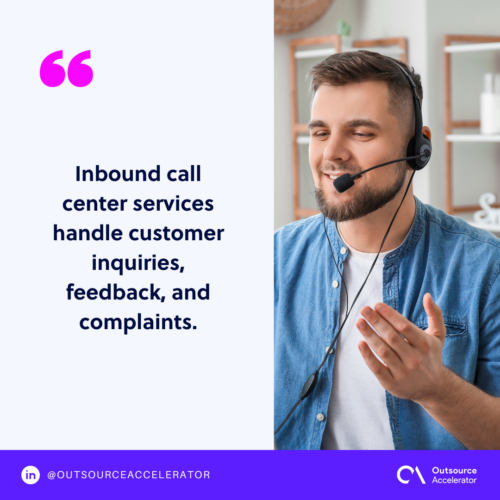Outsourcing Customer Service

Table of contents
Pros
Cons
Inbound services
Outbound services
Helpdesk
Technical support
Non-voice support
Virtual receptionist
Outsourcing customer service has become a strategic move for many businesses looking to enhance efficiency and reduce costs.
By delegating customer support tasks to external providers, companies can focus on their core operations while ensuring their customers receive top-notch assistance.
This approach not only helps in managing labor costs but also allows access to specialized expertise and technology.
Hiring a customer service team through business process outsourcing allows businesses to build their team while saving on labor costs. Overseas customer service teams usually offer affordable solutions without sacrificing quality.
The Philippines is one of the most popular outsourcing countries in Asia when it comes to outsourced customer support. The country boasts its highly skilled workforce, strong English proficiency, and cultural compatibility with the West, making it a perfect outsourcing destination.
In this blog, we’ll delve into the benefits of outsourcing customer service, key considerations, and how it can transform the customer experience for your business.
Customer support
Solopreneurs and startups usually handle customer inquiries on their own at first.
But as their business grows, their customer base increases, making handling inquiries more difficult. They need to find an easier and more affordable solution in building their customer service team.
Hiring a call center for their customer service team saves them a lot of time, energy, and costs.
In a customer support outsourcing environment, the service provider sets up a dedicated team for their business, equips the team with the latest equipment, and takes care of the employees’ needs, such as salaries, benefits, and training.

Pros and cons of outsourcing customer service
Outsourcing customer service has its pros and cons. However, risks can be lessened with enough preparation and proper management.
| Pros | Cons |
| Saves up to 70% on costs | Lack of quality control |
| Multi-channel services | Data confidentiality |
| Enables 24/7 coverage | Potential hidden charges |
| Customer service specialists | Difficulties in accents |
Pros
- Saves up to 70% on costs. The service provider in a customer service outsourcing company covers the expenses of setting up a team, such as office space, equipment, and tools needed. They also manage employee salaries, benefits, onboarding, and training.
- Multi-channel services. Agents are trained to use different channels of communication. They also exercise speed and accuracy in responding to different issues to serve more customers and ensure customer satisfaction.
- Enables 24/7 coverage. The workforce is also flexible in shifting schedules to serve their clients better. As a result, they can offer their services 24 hours a day, seven days a week.
- Customer service specialists. The Philippines has over two decades of providing customer service. Allowing businesses to tap into their experienced and seasoned workforce.
Cons
- Lack of quality control. Since a third-party company handles the entire operation, most businesses worry about having a lack of control over the quality of calls the customer service teams make.
- Data confidentiality. Since they deal with them daily, agents are more exposed to customer data and records. As a result, there might be a possible data breach and other security concerns.
- Potential hidden charges. Outsourced companies might include charges not in their initial proposal or the agreement. As a result, businesses might pay more for their services than agreed upon.
- Difficulties in accents. Customers may be confused with the accent of their assigned representative, which can cause miscommunication between the two parties.
Customer service roles
Outsourced customer service companies encompass roles ranging from traditional call handling to non-voice channel support, such as email and chat.
Below are some of the popular roles that people outsource:
Inbound services
Inbound call center services are designed to handle various aspects of customer interaction.
The dedicated inbound agents manage customer inquiries, feedback, and complaints, offering detailed information about products or services.
Inbound services play a crucial role in providing alternative solutions and assisting customers in resolving issues related to their concerns.

Outbound services
Outbound call centers specialize in reaching out to customers for various purposes. This type of call center role involves the following initiatives:
- Introducing new promotions and services
- Reminding customers of billing due dates and past-due accounts
- Conducting customer satisfaction surveys
The primary focus is proactively engaging with customers to enhance their experience and gather feedback.
Helpdesk
Helpdesk services are a specialized form of inbound support and customer service operation tailored to address customers’ issues related to products and services.
Helpdesk teams assist customers in finding solutions to their problems, offering a different level of support and guidance.
This call center service plays a crucial role in ensuring customer satisfaction by resolving issues promptly and efficiently.
Technical support
Technical support services troubleshoot customers’ hardware, software, or website-related issues.
The customer support team under this category typically does the following tasks:
- Handling concerns such as login problems
- Installing and uninstalling software
- Resolving server issues
- Providing guidance on the proper usage of devices
Furthermore, technical support ensures that customers can use products and services seamlessly.
Non-voice support
Non-voice support is a category that focuses on customer interaction through channels such as live chat, email, or social media.
Instead of traditional phone conversations, non-voice support agents attend to customer concerns and engage with them through written communication.
This approach provides flexibility and accommodates customers who prefer text-based communication.

Virtual receptionist
Virtual receptionists are particularly popular in the hospitality industry, playing a critical role in assisting guests.
These receptionists interact with customers predominantly through voice or live chat, serving as the first point of contact for inquiries, reservations, and general assistance.
Top companies to outsource customer service
The Philippines is a great option when it comes to customer service outsourcing. Most of the outsourced customer service providers in the country specialize in inbound, outbound, and non-voice services and cater to different sectors.
Check out the Top 40 BPO Companies guide to find out more.
Outsourcing customer service: FAQs
Let’s address frequently asked questions about outsourcing customer service
What is outsourcing service?
Outsourcing service refers to the practice of hiring external companies or individuals to handle specific business functions or tasks that could be performed in-house. This can include services like customer support, IT management, accounting, and marketing.
Businesses often outsource to reduce costs, access specialized expertise, improve efficiency, and focus on their core operations. Companies can streamline processes and enhance overall productivity.
Is it cheaper to outsource customer service?
Yes, outsourcing customer service is often cheaper than managing an in-house team. By leveraging overseas providers, businesses can reduce labor costs, benefit from economies of scale, and eliminate expenses related to hiring, training, and maintaining staff.
However, to ensure a positive customer experience, it’s important to balance cost savings with quality of service.
Do most companies outsource customer service?
Yes, many companies choose to outsource customer service as a strategy to improve efficiency and reduce costs.
This practice allows businesses to leverage external expertise and resources, providing high-quality support without the overhead associated with maintaining an in-house team.
While not every company outsources, it has become a common approach across various industries, especially among those looking to scale operations and enhance customer satisfaction.







 Independent
Independent




